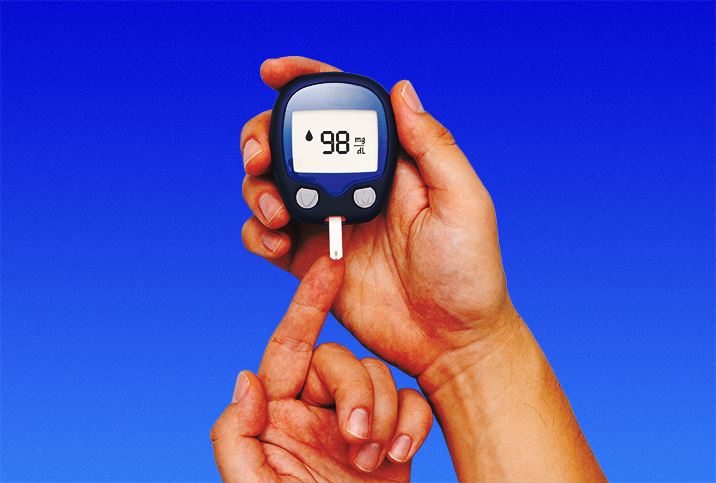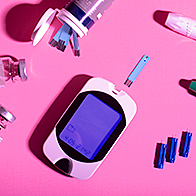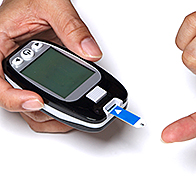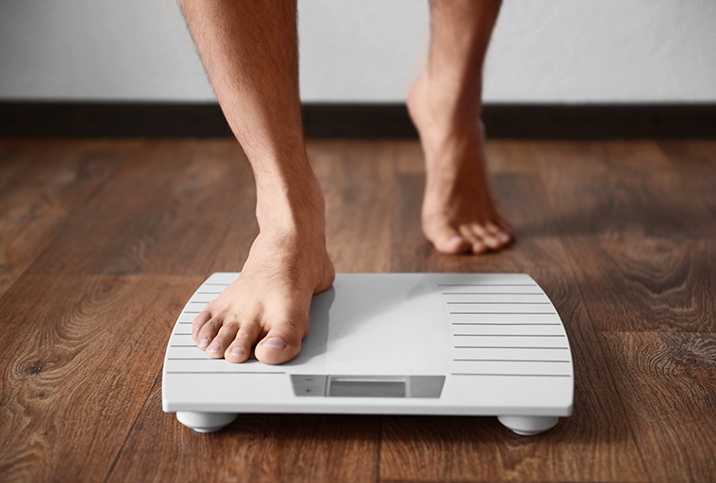5 Reasons Men With Diabetes Experience ED—and 1 Thing to Do About Each

Let's be honest, most men don't like going to the doctor. Nearly two-thirds of men wait as long as possible before doing so, even if they're aware something is wrong with their body, according to a 2019 survey conducted by the Cleveland Clinic. Further, 20 percent of men also admitted to not being honest with their doctor because they were embarrassed, uncomfortable or didn't want to be judged.
One of the most prominent subjects men lied about? Erectile dysfunction (ED).
If ED is an issue, the best way to solve it is by talking to your doctor and discovering the cause of the dysfunction. After all, any number of factors—such as anxiety, medication, prostate cancer, high blood pressure and surgical side effects—can contribute to ED.
One major reason for erectile dysfunction, however, often isn't talked about because it goes under the radar: diabetes.
"There was a period about a year ago where I wasn't able to maintain an erection," said Bryce M., a 26-year-old Minnesotan whose last name is being withheld for privacy reasons. "Even getting one in the first place was tough."
Bryce was diagnosed five years ago with type 1 diabetes, and he's still discovering many nuances of the disease. He brought it up with his doctor only because he'd been asked about ED in previous visits.
"I didn't know it was a thing that could happen because of diabetes," Bryce said.
One study found men with type 1 or type 2 diabetes were at a threefold higher risk of ED than men without diabetes, and could even develop ED 10 to 15 years sooner.
Why? Here are five of the primary reasons diabetes and ED are closely linked, and one action guys can take to address each reason.
1. Mental health
"Male sexual arousal is a complex process that involves the brain, hormones, emotions, nerves, muscles and blood vessels," said Emil Andersen, co-founder of ExSeed Health, a health and wellness center with offices in London and Copenhagen, Denmark. "Erectile dysfunction can result from a problem with any of these. Likewise, stress and mental health concerns can cause or worsen erectile dysfunction."
Sometimes, a combination of physical and psychological issues causes erectile dysfunction.
Diabetes is stressful to manage, and said stress can lead to issues in the bedroom.
"For instance, a minor physical condition that slows your sexual response might cause anxiety about maintaining an erection," Andersen explained. "The resulting anxiety can lead to or worsen erectile dysfunction."
Diabetes is stressful to manage, and said stress can lead to issues in the bedroom. Plus, people with diabetes face an increased risk for depression, which can be worsened by complications and other health problems that may arise from diabetes. Depression can then contribute to poor lifestyle choices, such as unhealthy eating, less exercise, smoking, increased alcohol consumption and weight gain, all of which can worsen ED.
Andersen acknowledged that men are typically unwilling to discuss sexual matters with their doctor. But if stress and depression are causing issues with erectile function, then your best bet is to talk to a doctor and figure out how to manage your mental state through self-care, therapy or medication.
2. Medication
While diabetes medications don't lead to ED, some medications used to treat other complications of the disease—high blood pressure and depression are two such culprits—might have side effects that lead to ED.
It's common for certain medications to contribute to or cause ED in the short term. For example, many antidepressants can cause sexual issues during the adjustment period, but if the issues persist, it might be time to have a discussion with your doctor about adjusting your medication. Additionally, ask your doctor if there are other changes you can make to better manage your diabetes.
Alternatively, drugs such as tadalafil (Cialis), sildenafil (Viagra) and vardenafil (Levitra, Staxyn) are designed to assist with ED specifically. A doctor might choose to prescribe one of these if your issues persist.
3. Damaged blood vessels
Both type 1 and type 2 diabetes cause high blood sugar. Also known as glucose, the sugar that travels through the body can damage blood vessels and arteries, including those in the penis, making it more difficult to get and maintain an erection.
Men who have long-term, uncontrolled diabetes face an increased risk of developing ED, and if the damage is severe enough, medications might not solve their problem.
For some men, the best solution for diabetes-related ED is using a wearable product such as a vacuum pump, which pulls blood into the penis, or a constriction device such as Eddie by Giddy™, which constricts the veins in the penis to optimize blood flow and maintain healthier erections. Vacuum pumps and constriction devices are often used in conjunction for the desired result, but definitely ask your doctor about mixing ED treatments.
In extreme cases, doctors can embed a penile implant in the patient's penis. These come in two forms: inflatable and semi-rigid. Most men might squirm at the thought or eschew the idea altogether, but remember that penile implants are only an option when other treatments have failed.
4. Testosterone levels
"Erectile function is dependent on several factors," Andersen said. "One of them is your sexual drive, which is impacted by testosterone. Therefore, if your testosterone is low, it may impact erectile function."
Men with type 2 diabetes also commonly experience low levels of testosterone (low-T), which can lead to decreased libido, loss of muscle mass and increased body fat at the waist. Additionally, low-T has been linked to a greater risk of insulin resistance, meaning cells in your muscles, fat and liver struggle to extract glucose from the blood.
Luckily, men have several ways to boost their testosterone levels, including high-intensity exercise and strength training, vitamin D supplements, and lowering stress levels to reduce the amount of cortisol, a hormone that blocks the effects of testosterone.
Low-T has been linked to a greater risk of insulin resistance, meaning cells in your muscles, fat and liver struggle to extract glucose from the blood.
About 25 percent to 33 percent of men with type 2 diabetes experience hypogonadotropic hypogonadism, a condition in which the body does not produce enough sex hormones, according to a 2018 study from the American Diabetes Association.
Testosterone therapy is one method of treatment for hypogonadism that may also be effective in treating ED in men with diabetes. Experts don't recommend the use of testosterone therapy to combat the normal effects of aging, but in cases where a medical issue such as hypogonadism or diabetic ED arises, your doctor may recommend it as an option.
5. Lifestyle choices
Many of the risk factors for diabetes also align with the risk factors for ED, Andersen pointed out. He identified a sedentary lifestyle, obesity, smoking, an unhealthy diet and alcohol consumption as some of the primary causes of both conditions.
Exercising, losing weight, eating better and cutting back on cigarettes and alcohol are some of the most straightforward actions men can take to proactively help with diabetes symptoms, including erectile dysfunction.
Giddy experts Dr. Bob Harding and clinical nutritionist Lahana Vigliano explain the importance of exercise and nutrition related to ED in the ED Guide video series. Click here to watch the video.




















